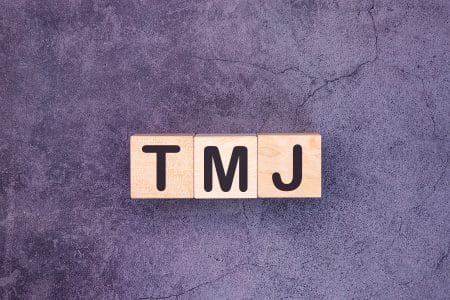 In our last blog, we looked at bruxism (chronic teeth grinding), and how this jaw joint disorder impacts your oral health. Today, your Overland Park, KS, dentist would like to look at a related, but very different, issue known as TMJ disorder. We want to explain how treating this issue helps you avoid uncomfortable symptoms, and could also help prevent the onset of complications like bruxism!
In our last blog, we looked at bruxism (chronic teeth grinding), and how this jaw joint disorder impacts your oral health. Today, your Overland Park, KS, dentist would like to look at a related, but very different, issue known as TMJ disorder. We want to explain how treating this issue helps you avoid uncomfortable symptoms, and could also help prevent the onset of complications like bruxism!
TMJ vs. Bruxism
While very different, these oral health issues are often related. TMJ disorder develops when intense pressure is placed on the jaw joints. People eventually develop trouble opening and closing their mouth, and could experience a number of uncomfortable symptoms, such as headaches and migraines, jaw pain and facial discomfort, popping or clicking in the jaw, and aches in the neck and shoulders. Unless treated, the pressure could also cause bruxism, and untreated bruxism itself could then lead to TMJ disorder.
What Happens in the Long Term?
Unless treated, the symptoms could grow more severe, and if you begin to grind your teeth, this could remove enamel and damage the structure, increasing the risk of tooth decay and dental infections. People then experience higher rates of tooth sensitivity and toothaches that grow more intense with time. To avoid complications that could lead to tooth loss and major discomfort, you should contact our team when you begin to experience one or more of the common symptoms we’ve discussed in today’s blog.
Possible Treatment Options
To ease pressure, we may start by correcting any misalignment with orthodontics, which helps ease jaw joint strain. We could address strain and improve bite balance by placing a custom-made dental restoration too. However, the most common option is to create an oral appliance. The device will be crafted based on detailed impressions and measurements we take of your entire smile. The completed device will look and fit like a mouthguard, and is worn as you sleep. The device helps reposition the jaw to ease pressure and stop TMJ-related discomfort. If you also grind your teeth, they help protect your smile from damage by placing a barrier between your upper and lower sets of teeth. If you have any questions about treating poor oral health, or if you simply need to schedule your next checkup and cleaning, then contact our team today!
Don’t Live with TMJ-Related Pain
We want to make sure you enjoy a healthy and comfortable smile, which means we have an oral appliance to address common issues related to jaw joint strain. If you have damaged teeth, then our team could also provide dental bonding and lifelike crowns to restore your smile. To learn more about our preventive treatment options, then schedule your consultation by calling Family First Dental in Overland Park, KS, today at 913-381-2600.
